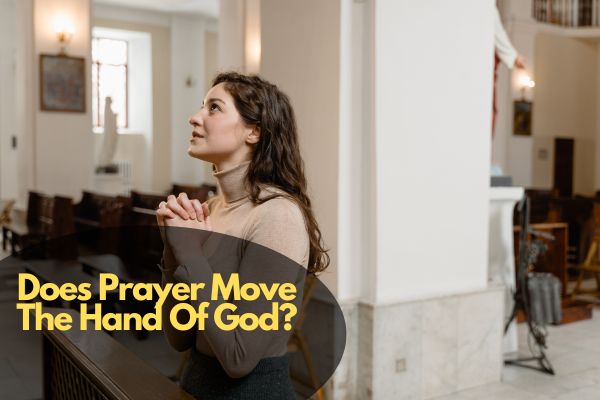Prayer has long been regarded as a powerful and profound practice across various religious and spiritual traditions. It is a means of communication with a higher power, a way to seek guidance, express gratitude, and request divine intervention. However, a question that has persisted throughout the ages is: Does prayer truly move the hand of God? This article looks into the complexities of prayer, exploring different perspectives and shedding light on the profound nature of this spiritual practice.
Does Prayer Move The Hand Of God
The question of whether prayer moves the hand of God is a deeply philosophical and theological one, and opinions on this matter vary among different religious traditions and individuals. There is no definitive answer that can be universally applied to all belief systems.
It’s important to remember that prayer is a multifaceted practice with various benefits, regardless of whether it directly influences God’s actions. Prayer can bring comfort, peace, and hope. It can foster a sense of connection with something larger than ourselves and provide strength and guidance in difficult times. Even if it doesn’t literally “move the hand of God,” prayer can still be a powerful tool for transformation and growth, both personally and spiritually.
The Nature of God
To understand the impact of prayer on the hand of God, it is essential to consider the nature of God as perceived in different religious and philosophical frameworks. Religions envision God in diverse ways, ranging from a personal deity who actively intervenes in human affairs to a transcendent force that operates through natural laws. The concept of God’s involvement in response to prayer varies, leading to different interpretations of the efficacy of prayer.
Prayer as a Means of Connection
Irrespective of beliefs about the nature of God, prayer serves as a means of connection between the individual and the divine. It allows individuals to express their deepest desires, fears, and hopes. Prayer provides solace, comfort, and a sense of being heard, regardless of the perceived direct intervention of God. Through prayer, individuals find solace and a sense of purpose, as well as a channel for self-reflection and spiritual growth.
Prayer and Divine Intervention
One perspective suggests that prayer has the power to influence God’s actions and bring about divine intervention. According to this viewpoint, sincere and fervent prayers can move the hand of God, leading to miracles, healing, and the fulfillment of requests. Proponents of this belief argue that God is responsive to the heartfelt pleas of the faithful, intervening in the natural course of events based on the supplications of individuals or communities.
Prayer as a Means of Personal Transformation
Another viewpoint emphasizes that prayer primarily serves as a means of personal transformation rather than directly influencing God’s actions. In this perspective, prayer is seen as a transformative practice that aligns individuals with divine principles, wisdom, and guidance. It is through prayer that individuals develop qualities such as patience, gratitude, and compassion, enabling them to navigate life’s challenges with greater resilience and wisdom.
The Mystery of God’s Will
A contrasting perspective suggests that God’s will is ultimately inscrutable and beyond human comprehension. According to this view, prayer does not seek to change God’s mind or dictate specific outcomes. Instead, it is an act of surrender and trust, allowing individuals to align themselves with the divine plan. Prayer is seen as an avenue for individuals to seek acceptance, strength, and wisdom to navigate through life’s trials, regardless of the specific outcome.
The Role of Faith
Faith plays a significant role in the efficacy of prayer. Believers often attribute the power of prayer to the strength of their faith and their unwavering trust in the divine. It is the faith that prayer will be heard and that there is a purpose behind every outcome that fuels the power of prayer. Faith is seen as a catalyst that deepens the connection between the individual and God, fostering a sense of peace, hope, and resilience.
Common Controversies
Personal Bias and Attribution: Controversies can also arise due to personal bias and subjective interpretation of events. Some individuals may attribute positive outcomes or coincidences to the power of prayer, while others may attribute the same events to natural processes or unrelated factors.
The Problem of Evil: One of the common controversies surrounding the idea that prayer can move the hand of God is the presence of evil and suffering in the world. Critics argue that if prayer has the power to influence divine intervention, then why does God allow innocent people to suffer?
Interfaith Dilemma: The idea that prayer can move the hand of God becomes more complex in a multicultural and interfaith context. Different religious traditions have their own prayers and beliefs about divine intervention. This raises questions about which prayers are more effective or valid, and how God responds to the prayers of individuals from different faiths.
Ethical Concerns: Controversies can also arise from ethical considerations related to prayer. For example, debates may arise regarding the appropriateness of praying for specific outcomes that may conflict with the well-being or autonomy of others. Questions may also arise about the responsibility of individuals who believe in the power of prayer to take action in addition to or instead of relying solely on prayer.
Conclusion
The question of whether prayer moves the hand of God is a profound and complex one. While different perspectives exist, it is evident that prayer holds immense significance in the lives of individuals, providing solace, guidance, and personal transformation. Whether prayer directly influences the actions of a divine being or serves as a means of aligning individuals with a higher purpose, it remains a powerful practice that nourishes the spiritual growth and well-being of believers. Ultimately, the impact of prayer transcends the realm of tangible outcomes, touching the depths of the human spirit and fostering a connection with the divine.






